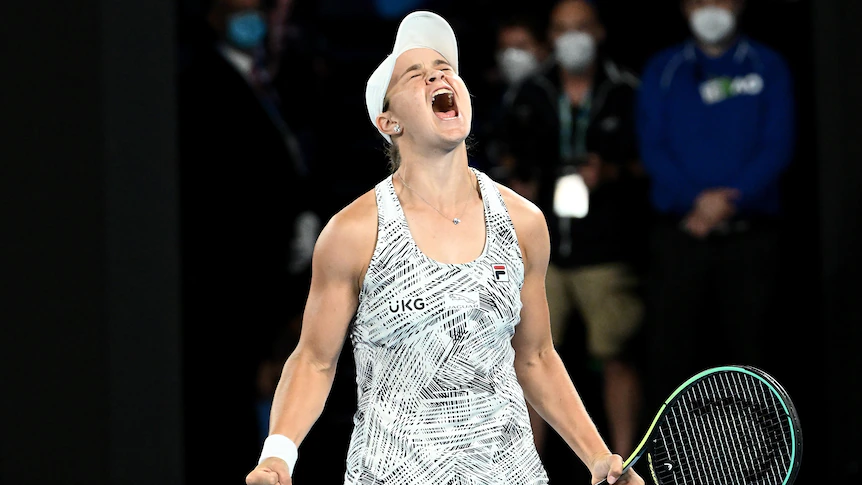It seems only weeks ago that the eyes of a nation broke out in the eyes of Ash Barty, who turned their 5-1 deficit in the second set of the Australian Open finals into a historic, cathartic victory.
That night, American Danielle Collins shed a tear on the podium and wondered privately how on earth such a small and friendly opponent had so ruthlessly degraded her.
Now Collins and other candidates face an unimaginable opportunity of their own: at 25, with the world at their feet, Barty has retired from tennis, forgoing her zenith and trophies galore.
There’s no perfect analogy to the shock that is emerging at the moment – the death of Shane Warne, the start of the war and the devastation of the pandemic also add a decent dose of perspective – but it’s something of Michael Jordan’s first retirement. .
For Jordan, the pressure that came with his accomplishments was too much, the personal investigation too great, and the loss of freedom too oppressive.
Knownly he dropped out and instead played baseball, just as Barty’s first tennis “retirement” of 2014 meant a switch to cricket.
Between the pair there is a more meaningful overlap: golf, with its fresh air, open meadows and barriers to the outside. At a golf course, Barty can compete in anonymous insurance. At Rod Laver Arena – whose competitions are decorated with banners, posters and flags with her image – she can never escape prying eyes and well-meaning pressure.
Jordan’s biographer David Halberstam explained:
“Golf became more and more important to him, his great escape from all his other numbing responsibilities on the court, a place different from practice and the players themselves, where he could find and let go a little freedom. In a world where always “People wanted something from him, his whole freedom and intellect were at stake now.”
Barty’s career and fame are of vastly different proportions, but the parallel dilemmas are obvious: the tireless physical grinding of the sport, its status as not just a city, but a great hope of a nation (Australian Open organizers are currently breaking into ‘Heif) and the necessity. to meet an ever-increasing range of expectations and obligations – to win, to continue to win, to always do it in their humble, perfect way.
In fact, her most important obligation, as she made clear in the video, was what made her decision radiate to herself. She admitted to feeling a little unfulfilled in achieving her lifelong goal – the 2021 Wimbledon singles title.
When Barty explained it, there was a heartbreaking moment in which her voice dropped and her face seemed to ask, “Does anyone understand this? Can I expect them to do that?”
Barty goes on her own terms
The hardest thing for fans to accept is that Barty did the right thing.
To pursue checks, please sponsor and play without the joy that infused her game is just not her. And for the uncomplicated joy she has already brought millions, she is no one to blame.
If at all, she has gone far beyond the call of duty, not only is she a rare sporting talent, but an exemplary role model for a generation more comfortable raising a hand to say, “I’m struggling a bit here.”
Little athletes often carp about their “heritage”. While she has a greater understanding that sport is not life, she is a champion on two fronts.
The memory that will remain brightest is Barty, who stands at the Rod Laver Arena to record her famous victory with her inspiration, Evonne Goolagong Cawley. It was a vision of not only indigenous sports size, but a different set of opportunities for Australia – fairer, friendlier, more proud.
What Barty is doing now is his business, but it’s safe to assume it’s not going to be foreign. What Australian tennis and its troubled administrators can do to cover up their embarrassment is a much more frightening question, as Barty is not only the smiling face of his big event, but the heart and soul of his attempts for a meaningful Create connection with fans and base players. .
With quite a bit of irony, their disappearance from the tour will surely intensify the pressure that Nick Kyrgios faces. A crazy idea with many applications: Can we treat him like Barty?
There’s no dilemma at all for Barty’s biographers. Melbourne sportswriting veteran Ron Reed has recently set up funding for the third edition of his Barty book, an update that included what turned out to be their last major match.
He says the process was similar to his biography of another Australian tennis major, Frank Sedgman: there were simply no skeletons in the wardrobe.
“No bad word is said about her,” Reed said.
“It makes it easier for me, I suppose, because I do not have to worry about balance. She’s a wonderful role model who never misplaces a word or a foot. No matter how much you emphasize it, you will never be accused of going over the top.
“She’s not perfect because no one is, but anyway it was hard not to find fault with her.
Actually, if you remember, it was a surreal moment in which Barty was criticized for his behavior – for, above all, celebrating her Australian Open triumph by quietly sipping a beer during her post-game interview.
But the Australians did not have it. Now the queue for her to buy another can never stop.


Add Comment